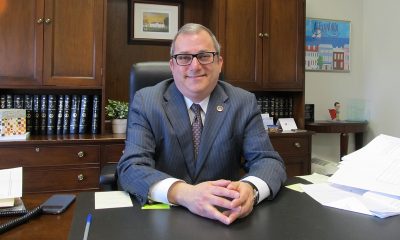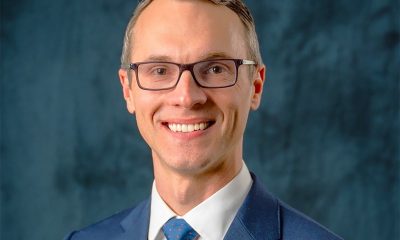Local
Hundreds of students ask Fairfax schools to return LGBTQ books to libraries
Parents’ complaints prompted two titles’ removal for ‘detailed review’

A total of 426 LGBTQ students and allies from more than 30 Fairfax County public high schools sent a letter on Thursday to the county school board and the school system’s superintendent urging them to reject requests that two LGBTQ themed books be removed from the school libraries.
The two books, “Lawn Boy,” a novel by author Jonathan Evison, and “Gender Queer: A Memoir,” an illustrated autobiography by non-binary author Maia Kobabe, each contain graphic descriptions of sexual acts, including sexual acts between consenting juveniles.
Following strong objections to the books by parents at a Sept. 23 meeting of the Fairfax County School Board, officials with Fairfax County Public Schools announced they had removed the books from the school libraries to reassess their suitability for high school students.
The books have received favorable reviews in various literary publications, and both have received the American Library Association’s Alex Award, an annual award that recognizes the year’s 10 books written for adults that the association says have a special appeal to young adults ages 12 through 18.
“We are a group of over 425 queer students and allies across the Fairfax County Public Schools who are part of the Pride Liberation Project, a coalition of students working to uplift the Queer community,” the student letter says.
“Student representatives from over 30 schools, including nearly every high school in Fairfax County Public Schools, have signed this letter, and many of us are students of color, low-income, gender expansive and not out to our families and communities,” the letter says.
“We are writing to ask you to reject calls to remove Maia Kobabe’s ‘Gender Queer’ and Jonathan Evison’s ‘Lawn Boy’ from Fairfax County Public Schools libraries,” it says.
Each of the 426 students who joined the letter signed with their initials rather than their full names while also writing the name of the school they attend.
Aaryan Rawal, co-founder of the Pride Liberation Project, which initiated the student letter, told the Washington Blade the group decided to allow students to sign with their initials because many LGBTQ students are fearful of possible negative repercussions if they come out publicly at school or to their parents.
“We have students who are even afraid to sign these names with their initials because they worry about what’s going to happen if their teacher finds out who’s not supportive or what happens if a classmate finds out who’s not supportive,” Rawal said.
“What’s going to happen if my parents find out if they’re not supportive?” Rawal said, expressing the concern of students with whom he has spoken. “We have students who have experienced homelessness because they’ve been outed to their parents,” he said. “And so, it is very much a real threat. We’re not exaggerating that whatsoever.”
The student letter states that “hundreds of books in our schools already depict heterosexual relationships and physical intimacy.” It names several of them, including Simone Elkeles’ “Rules of Attraction,” Stephen King’s “It,” Meg Cabot’s “Ready or Not,” and John Green’s “Looking for Alaska.”
“By holding books that describe LGBTQIA+ relationships to a different standard compared to these novels, Fairfax County Public Schools creates an inequitable, exclusionary, and heteronormative educational environment for queer students,” the letter states.
“As students, we are tired of being scrutinized and targeted for who we are,” says the letter. “We simply want to be treated equally in our schools, including in our libraries. Please reject attacks against LGBTQIA+ literature and allow ‘Gender Queer’ and ‘Lawn Boy’ to remain in our schools,” the letter concludes.
Julie Moult, a spokesperson for the Fairfax County Public Schools, told the Blade in an Oct. 8 email that the review process for the two books by school officials, including two committees appointed by Supt. Scott Brabrand, would take up to 45 days to complete from the time it began shortly after the Sept. 23 school board meeting.
Moult said it would be inappropriate for the superintendent to comment on the student letter until the outcome of the review process becomes known.
“The recommendation of the committees will be put forward to the assistant superintendent of instructional services who will make a final decision as to whether Fairfax County Public Schools continues to provide access to these books in our high school libraries,” school officials said in a statement released last month.
Rawal said students who helped write the letter they sent to the school board and the superintendent strongly dispute claims by several parents who described the two books in question as a form of pornography that’s unsuitable for high school students.
“I mean that’s just not accurate,” Rawal said. “We’ve read both books cover to cover, and I don’t see how there is a debate here. Mentioning sex does not make something pornography,” he said. “These books reference sex certainly but relegating the content of these books just to sex is a gross misrepresentation of what they’re really about.”
Maryland
Md. Commission on LGBTQIA+ Affairs released updated student recommendations
LGBTQ students report higher rates of bullying, suicide

The Maryland Commission on LGBTQIA+ Affairs has released updated recommendations on how the state’s schools can support LGBTQ students.
The updated 16-page document outlines eight “actionable recommendations” for Maryland schools, supplemented with data and links to additional resources. The recommendations are:
- Developing and passing a uniform statewide and comprehensive policy aimed at protecting “transgender, nonbinary, and gender expansive students” against discrimination. The recommendation lists minimum requirements for the policy to address: name, pronoun usage, and restroom access.
- Requiring all educators to receive training about the specific needs of LGBTQ students, by trained facilitators. The training’s “core competencies” include instruction on terminology, data, and support for students.
- Implementing LGBTQ-inclusive curricula and preventing book bans. The report highlights a “comprehensive sexual education curriculum” as specifically important in the overall education curriculum. It also states the curriculum will “provide all students with life-saving information about how to protect themselves and others in sexual and romantic situations.”
- Establishing Gender Sexuality Alliances “at all schools and in all grade levels.” This recommendation includes measures on how to adequately establish effective GSAs, such as campaign advertising, and official state resources that outline how to establish and maintain a GSA.
- Providing resources to students’ family members and supporters. This recommendation proposes partnering with local education agencies to provide “culturally responsive, LGBTQIA+ affirming family engagement initiatives.”
- Collecting statewide data on LGBTQ youth. The data on Maryland’s LGBTQ youth population is sparse and non-exhaustive, and this recommendation seeks to collect information to inform policy and programming across the state for LGBTQ youth.
- Hiring a full-time team at the Maryland Department of Education that focuses on LGBTQ student achievement. These employees would have specific duties that include “advising on local and state, and federal policy” as well as developing the LGBTQ curriculum, and organizing the data and family resources.
- Promoting and ensuring awareness of the 2024 guidelines to support LGBTQ students.
The commission has 21 members, with elections every year, and open volunteer positions. It was created in 2021 and amended in 2023 to add more members.
The Governor’s Office of Communication says the commission’s goal is “to serve LGBTQIA+ Marylanders by galvanizing community voices, researching and addressing challenges, and advocating for policies to advance equity and inclusion.”
The commission is tasked with coming up with yearly recommendations. This year’s aim “to ensure that every child can learn in a safe, inclusive, and supportive environment.”
The Human Rights Campaign’s most recent report on LGBTQ youth revealed that 46.1 percent of LGBTQ youth felt unsafe in some school settings. Those numbers are higher for transgender students, with 54.9 percent of them saying they feel unsafe in school.
Maryland’s High School Youth Risk Behavior Survey reveals a disparity in mental health issues and concerns among students who identify as LGBTQ, compared to those who are heterosexual. LGBTQ students report higher rates of bullying, feelings of hopelessness, and suicidal thoughts. Nearly 36 percent of LGBTQ students report they have a suicide plan, and 26.7 percent of respondents say they have attempted to die by suicide.
The commission’s recommendations seek to combat the mental health crisis among the state’s LGBTQ students. They are also a call for local and state governments to work towards implementing them.
Virginia
Va. lawmakers consider partial restoration of Ryan White funds
State Department of Health in 2025 cut $20 million from Part B program

The Virginia General Assembly is considering the partial restoration of HIV funding that the state’s Department of Health cut last year.
The Department of Health in 2025 cut $20 million — or 67 percent of total funding — from the Ryan White Part B program.
The funding cuts started with the Trump-Vance administration passing budget cuts to federal HIV screening and protection programs. Rebate issues between the Virginia Department of Health and the company that provides HIV medications began.
Advocates say the funding cuts have disproportionately impacted lower-income people.
The Ryan White HIV/AIDS Program, a federal program started in 1990, provides medical services, public education, and essential services. Part B offers 21 services, seven of which remained funded after the budget cuts.
Equality Virginia notes “in 2025, a 67 percent reduction severely destabilized HIV services across the commonwealth.”
Virginia lawmakers have approved two bills — House Bill 30 and Senate Bill 30 — that would partially restore the funding. The Ryan White cuts remain a concern among community members.
Both chambers of the General Assembly must review their proposed changes before lawmakers can adopt the bills.
“While these amendments aren’t a full restoration of what community-based organizations lost, this marks a critical step toward stabilizing care for thousands of Virginians living with HIV,” said Equality Virginia Executive Director Narissa Rahaman. “Equality Virginia plans to continue their contact with lawmakers and delegates through the conference and up until the passing of the budget.”
“We appreciate lawmakers from both sides of the aisle who recognized the urgency of this moment and will work to ensure funding remains in the final version signed by the governor,” added Rahaman.
District of Columbia
D.C. Black Pride theme, performers announced at ‘Speakeasy’
Durand Bernarr to headline 2026 programming

The Center for Black Equity held its 2026 DC Black Pride Theme Reveal event at Union Stage on Monday. The evening, a “Speakeasy Happy Hour,” was hosted by Anthony Oakes and featured performances by Lolita Leopard and Keith Angelo. The Center for Black Equity organizes DC Black Pride.
Kenya Hutton, Center for Black Equity president and CEO, spoke following the performances by Leopard and Angelo. Hutton announced this year’s theme for DC Black Pride: “New Black Renaissance.”
Performers for 2026 DC Black Pride were announced to be Bang Garcon, Be Steadwell, Jay Columbus, Bennu Byrd, Rue Pratt and Akeem Woods.
Singer-songwriter Durand Bernarr was announced as the headliner for the 2026 festivities. Bernerr gave brief remarks through a video played on the screen at the stage.
DC Black Pride is scheduled for May 22-25. For more information on DC Black Pride, visit dcblackpride.org.



















